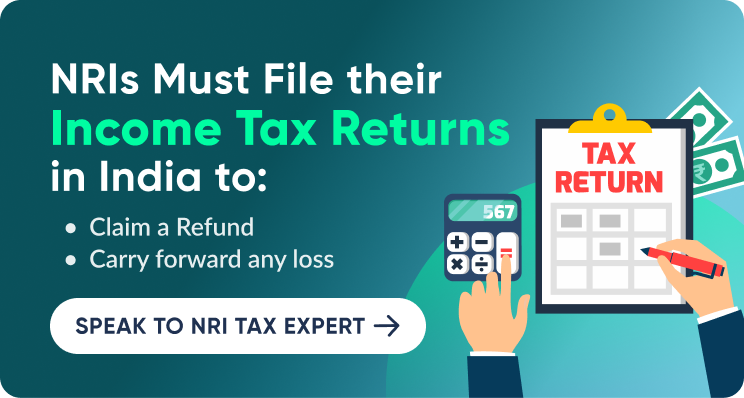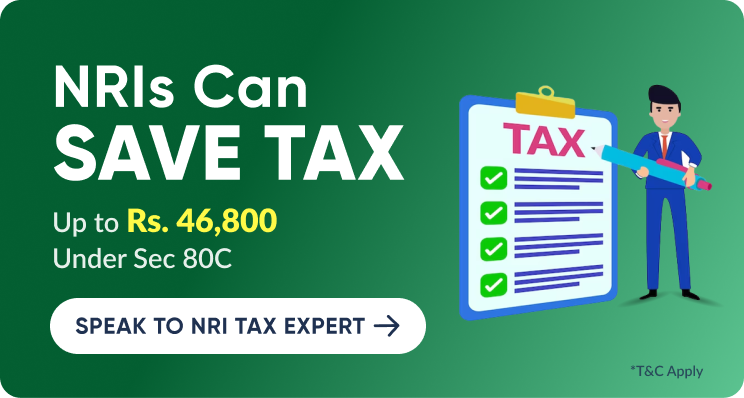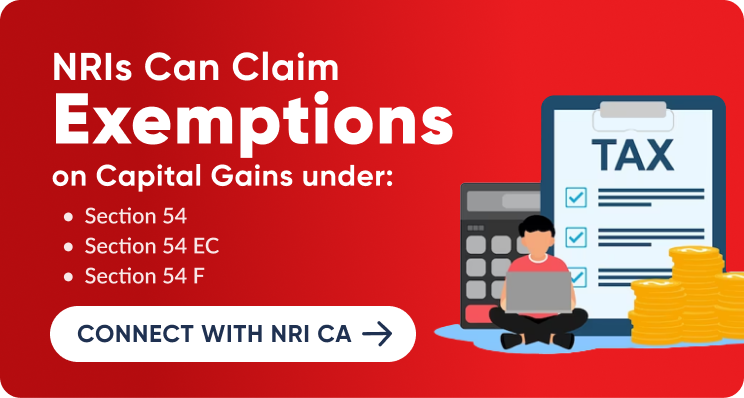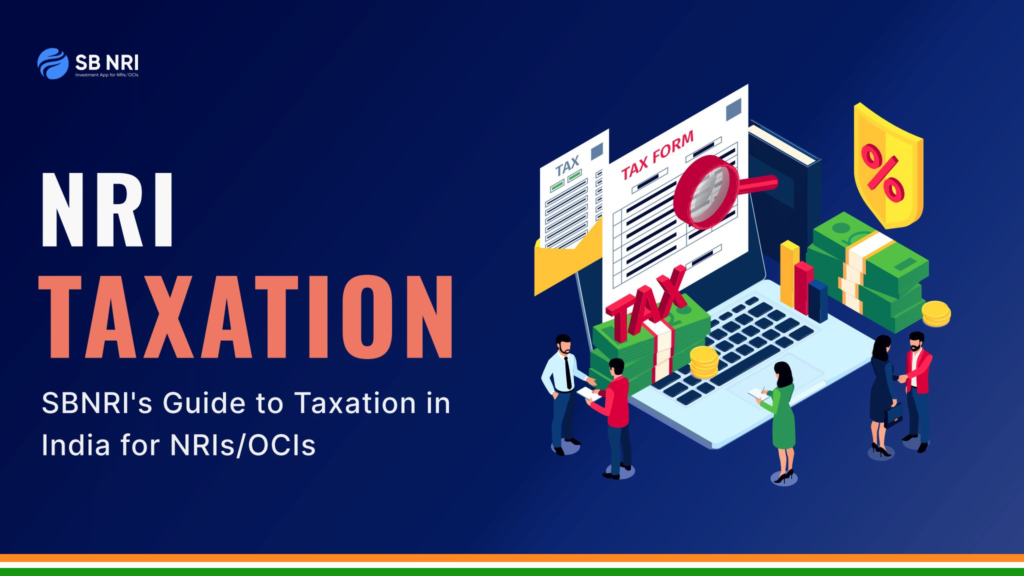
Many Non-Resident Indians(NRI) and Overseas Citizens of India(OCIs). choose to rent out residential property in India while they are living abroad. If you are an NRI who wants to rent out a residential flat or apartment but are unsure of income tax aspects, then this guide on NRI tax on rental income in India will help you out. Find all you need to know about tax rates on rental income, Income tax rules, and more.
Who is an NRI?
According to the Income Tax Act, a citizen is said to be a resident of India if-
- The status of Indian Resident is given to those who have stayed in India for about 182 days during the financial year, or
- Have stayed for a minimum of one year (365 days) in the last four years and stayed for 60 days in the concerned year.
Anyone not following the above-mentioned condition, will be considered an NRI or a Non-Resident Indian.
Do NRIs have to Pay Tax on Rental Income?
Yes, if a Non-Resident Indian (NRI) rents out a property located in India, then he/she is liable to pay tax, applicable under the provisions of the Income Tax Act, on the rental income from that property. The tax is applicable under the provisions of the Income Tax Act, 1961.
Also read: TDS on Sale of Property by NRI in India [New Rates for 2024]
NRI Tax on Rental Income in India
In case you earn income by renting out your property in India, you will be required to pay taxes on your rental income to India. The marginal tax income rate applicable to NRIs will be levied on this income. To determine your total income, add your property income to your other sources of income like salary, and dividends. This will help you arrive at the figure that will be subject to the applicable tax slab rate. Additionally, you may also be subject to a 4% education cess and surcharge. If your total income (including rental income) is less than Rs 2.5 lakh, you will not be liable to pay taxes. Applicable taxes will be deducted at the source at the rate of 31.2%.

What if Rental Income Exceeds the Exemption Limit?
If NRI rental income exceeds the exemption limit, then:
- The tenant of the rented property must deduct a mandatory TDS of 31.2 % from the rent each month.
- The tenant must have a TAN i.e. Tax Deduction and Collection Account Number.
- They also have to deposit the due TDS amount and submit the TDS certificate to the NRI.
- If the TDS exceeds the tax liability of the NRI, he/she will receive a tax refund. NRIs will get the tax refund only when they file for your tax return.
- NRIs can also apply for a TDS certificate for a deduction of TDS at a reduced rate. This would be with the Jurisdictional Assessing Officer (AO) of the Income Tax Department.
- Once the NRIs receive the TDS certificate, the tenant has to deduct the TDS at the rates agreed upon and deposit it against the NRI’s PAN.
What If Tax on Rental Income is Not Paid?
If an NRI fails to pay tax on rental income, then the income may attract prosecution under Section 276B of the Income Tax Act, 1961. As per the act, the taxpayer shall be punished with imprisonment for a term that may extend to six months. He/she shall also be liable to pay a fine which shall be not less than a sum calculated at the rate of 15% p.a. on the amount of such tax from the date on which such tax was deductible to the date on which such tax is paid.
Also read: NRI Income Tax Slab Rates for FY 2023-24 (AY 2024-25)
Tax Exemption on Rental Income for NRIs
There are two scenarios where NRIs may be exempt from paying taxes on their rental income up to a certain amount:
- NRIs who own property can be exempted from paying taxes on rental income if they possess a certificate indicating that their total income from India falls below the exemption limit. This certificate, as per Section 197, permits the taxpayer to pay a lower tax rate on rental income according to the order of the AO.
- Certain countries have signed the Double Tax Avoidance Agreement with India. If an NRI’s country of residence has signed this agreement, they may not be subject to double taxation on rental income from their property in India. This agreement has been signed by over 80+ countries worldwide, including Canada, Australia, the UK, and the USA, among others.

Deductions Under Old Tax Regime for Rental Income
| Nature of expense | Self-occupied property | Let out property | Deemed let out property |
|---|---|---|---|
| Property tax | Nil | Amount paid | Amount paid |
| Standard deduction | Nil | (Rent reduced by property tax) *30%, irrespective of actual expenditure | (Rent reduced by property tax) *30%, irrespective of actual expenditure |
| Interest on home loan | Interest paid on loan borrowed, including 1/5th of the total amount of pre-construction interest. However, the maximum deduction available is ₹200,000 | Interest paid on loan borrowed, including 1/5th of the total amount of pre-construction interest | Interest paid on loan borrowed, including 1/5th of the total amount of pre-construction interest |
Deductions Under New Tax Regime for Rental Income
| Nature of expense | Self-occupied property | Let out property | Deemed let out property |
|---|---|---|---|
| Property tax | Nil | Amount paid | Amount paid |
| Standard deduction | Nil | (Rent reduced by property tax) *30%, irrespective of actual expenditure | (Rent reduced by property tax) *30%, irrespective of actual expenditure |
| Interest on home loan property | Nil | Interest paid on loan borrowed including 1/5th of the total amount of pre-construction interest | Interest paid on loan borrowed including 1/5th of the total amount of pre-construction interest |
How do NRIs Collect Rent?
- The tenant can transfer the rent money to the Non-Resident Ordinary Account (NRO Account) of the NRI. As per regulations, up to $1 million of NRO funds can be repatriated per financial year.
- The tenant can also remit the rent directly to the NRI’s foreign bank account after submitting Form 15CA online to the Income Tax Department. Depending on the situation, Form 15CB might need to be submitted before Form 15CA.
- A chartered accountant must verify payment details, such as the TDS rate, DTAA (if applicable), and other information about the remittance.
- Upon submission of both Form 15CA and 15CB to an authorized bank, the remittance will be authorized.
Also read: 5 Tips for NRIs Filing Income Tax Returns in India
What is Deemed Rent?
If you are an NRI with multiple residential properties in India, here are some tax implications:
- One property is considered self-occupied, and the other is deemed rented out. The self-occupied property is not subject to tax. For the property deemed rented out, there will be an estimated rent that will be used to calculate the tax.
- If you have one residential property in India and you do not rent it out, it will be considered self-occupied, and there will be no tax liability.
- The rental income will be taxed annually if you own one residential property and rent it out.
- If you own two properties, and one is rented out, then one property will be considered self-occupied, while the rented-out property will be taxed.
- If you own two houses, and neither of them is rented out, then one house will be deemed self-occupied, while the other will be deemed as if it were rented out and will be taxed. You can choose which house you want to keep as self-occupied.

Things NRIs Must Remember When Renting Out a Property
Given below are some points that NRIs must keep in mind when renting out a property:
- To make tax deductions and transactions easier, it is recommended that you open a TAN and NRO account.
- When renting out your property, it is important to verify your tenant’s identity and ask for their PAN card details.
- Make sure to create a rent agreement and have it signed by your tenant to avoid any future disputes.
- Keep track of your annual rental income to ensure that the correct amount of TDS on rent is calculated and deducted.
- It’s essential to verify that the tenant has deposited the TDS on rent and to obtain a copy of Form 15CA for the concerned financial year.
Also read: Can NRIs file ITR 1 in India? Types of ITR forms for NRIs
Calculate your TDS Refund with SBNRI’s TDS Refund Calculator
A TDS refund is the process of reclaiming the excess tax deducted at source by the payer if the actual tax liability of the taxpayer is lower than the TDS deducted. This situation typically arises when the income tax calculated on the total income is less than the TDS already deducted. To claim a TDS refund, taxpayers need to file an income tax return (ITR). The Income Tax Department processes the ITR and verifies the details. If the tax department finds that the TDS paid is more than the actual tax liability, the excess amount is refunded to the taxpayer.
You can easily find out how much tax refund you can get by calculating your TDS Refund from this TDS Refund Calculator.
Access SBNRI’s Exclusive NRI Taxation Guide

NRIs and OCIs can now access SBNRI’s exclusive NRI Taxation Guide covering in-depth information about DTAA, Gift Tax, Rental Income Tax, ITR Filing, Types of ITR Forms for NRIs, Capital Gain Tax, Income Tax, and more. The report will help you understand India taxation on mutual funds, other asset classes and how you can comply with the regulations.
Access NRI Taxation report here
Looking for NRI ITR Filing? Connect with SBNRI NRI Tax Expert CA Today!

Due to a complicated tax system, understanding tax laws can be confusing and NRIs may be subject to additional fees or miss claiming deductions and other benefits. At SBNRI, we understand this struggle. You can download SBNRI App to connect with our NRI Tax Experts to know more about new TDS/ TCS rules for NRIs. You will also get end-to-end assistance related to NRI tax filing.
SBNRI will also help you get a lower TDS Certificate. You can also click on the button below to ask any questions. Visit our blog and YouTube Channel for more details.
FAQs
What is a Double Tax Avoidance Agreement (DTAA)?
The Double Taxation Avoidance Agreement (DTAA) is a treaty that is signed between India and 80+ countries to help NRIs avoid paying taxes twice on the income earned in their country of residence as well as in India.
Can NRIs transfer property in India?
Yes, NRIs can transfer one’s immovable property in India to a resident Indian. NRIs can transfer one’s immovable property (other than agricultural land or farmhouse) to a citizen of India residing abroad or a PIO card holder resident outside India.
How is rental income taxed for NRI in India?
The tax rate for TDS on rent to NRI is 30% (Section 195 of the Income Tax Act, 1961) plus applicable cess and surcharge, cumulatively capped at a maximum of 31.2%* as per the new tax regime.
How much rental income is tax-free?
If your total income (including rental income) is less than Rs 2.5 lakh, you will not be liable to pay taxes.
How is rent paid to non-resident taxed?
The tax rate for TDS on rent to NRI is 30% (Section 195 of the Income Tax Act, 1961) plus applicable cess and surcharge, cumulatively capped at a maximum of 31.2%* as per the new tax regime.
What is not taxable for NRI?
For non-residents, income that accrues or arises outside India is not subject to taxation in India. Only income that is earned or received in India, or income that is deemed to be earned in India, is taxable for NRIs in India.
How to avoid TDS for NRI?
One way is by opening a specific bank account like:
- A Non-Resident Ordinary Rupee Account (NRO)
- A Foreign Currency Non-Resident Account (FCNR)
- A Non-Resident External Account (NRE)
What is the TDS on NRI property?
TDS (Tax Deducted at Source) shall be deducted whenever any property is sold/ purchased. The buyer needs to deduct TDS and pay the balance to the seller. The amount to be deducted depends on the residential status of the seller. In the case of an NRI seller, the amount of TDS to be deducted will depend on the quantum of money received by the seller.
Is TDS compulsory for NRI?
TDS is paid by any non-residents for any amount generated from business transactions in India. The amount may or may not be an income of a profit. NRIs have to pay TDS even for income types from which resident Indians are liable, like dividends on mutual funds.
How can NRIs avoid paying TDS on property sale?
If an NRI is selling property in India, the buyer is required to deduct TDS at the rate of 20% in case of long-term capital gains. However, if the property is sold before two years, TDS shall be deducted at the rate of 30% as a short-term capital gains tax.
What is the TDS rate on sale of property by NRI?
- Long-term capital gains on the sale of property held for more than 2 years: 20%
- Short-term capital gains on the sale of property held for less than 2 years: As per the income tax slab rates of the seller



